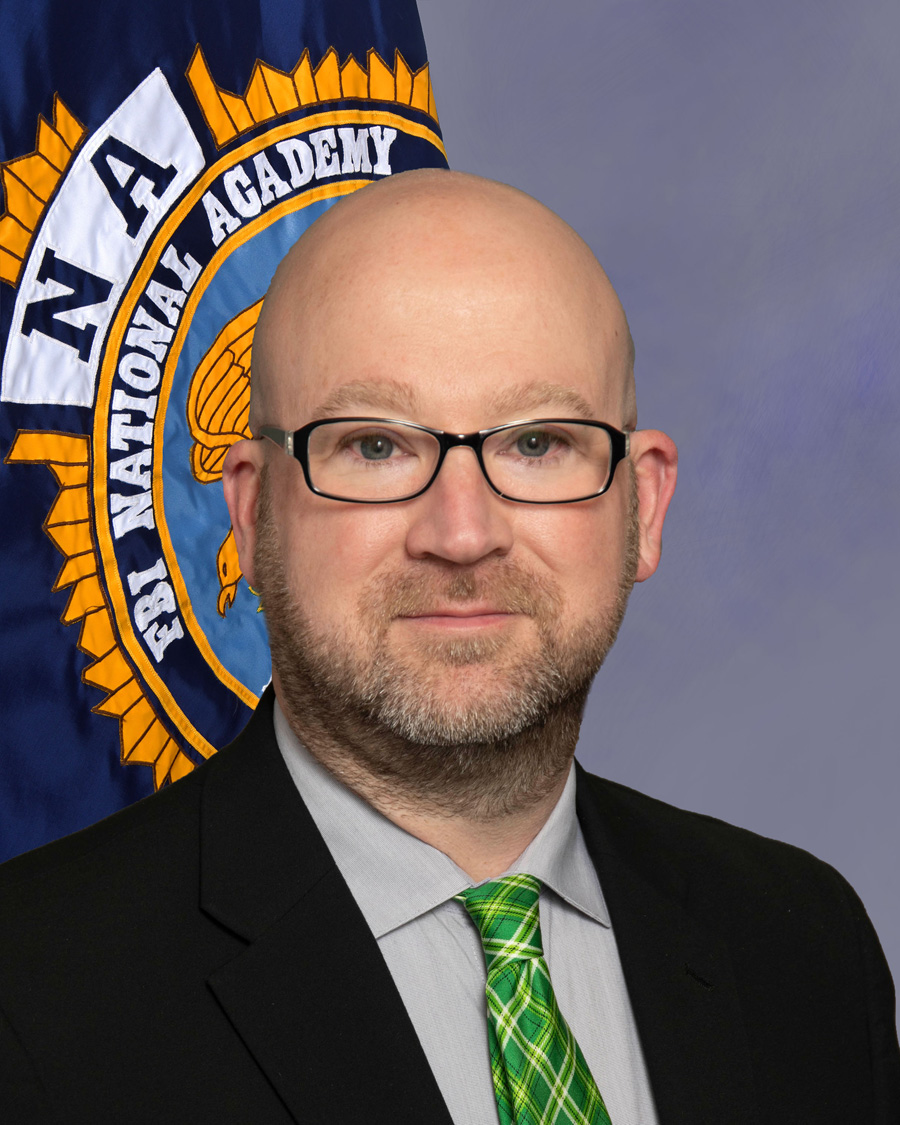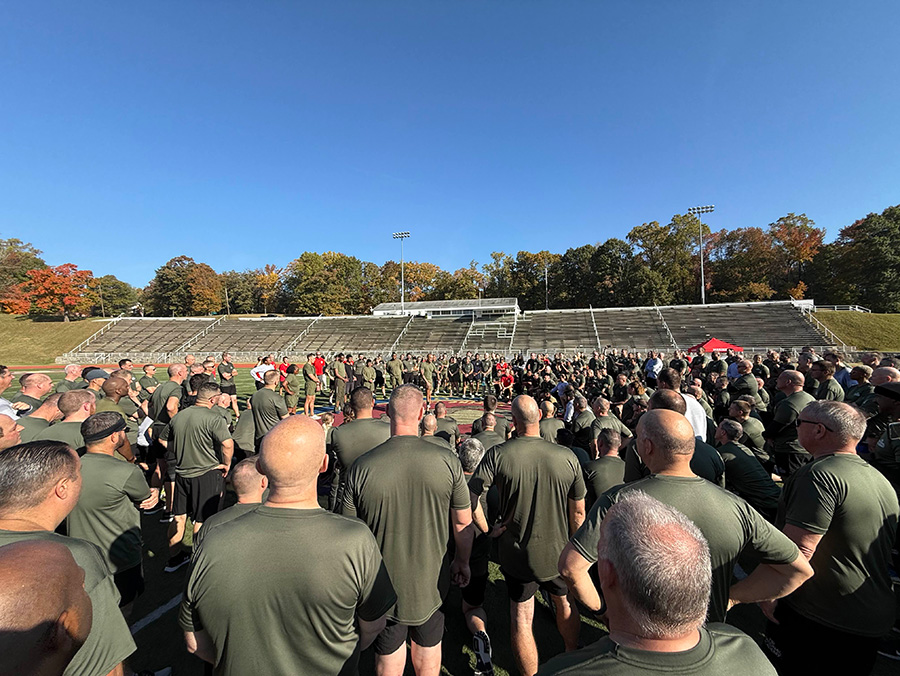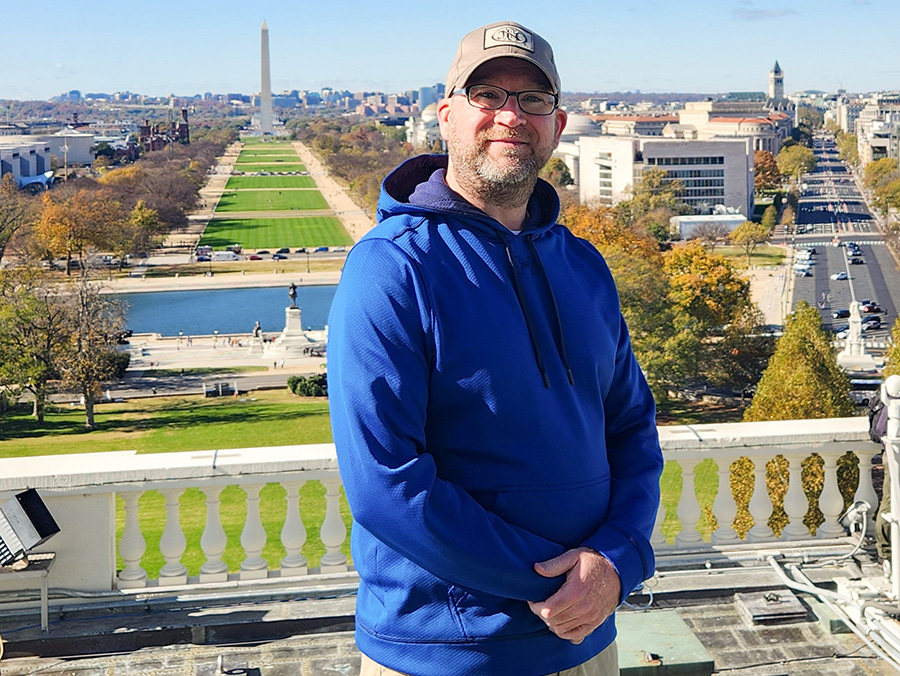Conquering the Yellow Brick Road
UNT Police Assistant Chief Jeremy Polk ('00 M.M., '23 M.S.) takes on the FBI Academy
January 8, 2025

Asst. Chief Jeremy Polk at the FBI National Academy
It was a foggy December morning at the FBI Academy in Quantico, Virginia. The clouds clung to the mountains, low and thick. It wasn't freezing, but the 40-degree temperature coupled with the rain sure made it seem like it was.
Jeremy Polk ('00 M.M., '23 M.S.), assistant chief of the UNT Police Department, was an hour into the grueling two-hour physical challenge on the Marine obstacle course known as "The Yellow Brick Road." Ahead of him were muddy, steep inclines to scale and cliffs to rappel down, and with every step, he could see his breath in front of him and feel his heart pound in his chest.
But not once did he question why he was there. He knew. He was one of a very few to be selected for the FBI Academy, one of only six university police department officers. This was the moment he'd been preparing for, and he was poised for the finish -- freezing cold rain, mud and all.
"When I applied seven years ago, I was a different person," Polk says. "Most of the individuals who are accepted have about 20 years of experience in the field. You'd think they'd take it easy on us with the training. But they definitely did not."
The Yellow Brick Road was the culmination of an 11-week stint at the 292nd session of the FBI's National Academy. The class consisted of men and women from 48 states, the District of Columbia and Guam, and included members of law enforcement agencies from 27 countries, eight military organizations and five federal civilian organizations. Trainees had to master the equivalent of two undergraduate and four graduate academic courses on theoretical frameworks for law enforcement, counterterrorism and public safety, offered in partnership with the University of Virginia. Each 12-hour day was packed with physical endurance activities, academics and evening forums with keynote speakers who are experts in their fields.

The 292nd session of the FBI Academy works out with Wounded Warriors Project organization.
"We learned so much about how to better understand available resources -- from new technologies and DEA, ATF and FBI tactics to the efforts of nongovernmental organizations -- and how to use them for the benefit of our communities," Polk says. "For me, that means making UNT as safe as it can be."
The experience was deeply personal for Polk, and he knew it would benefit him to soak up as much information as possible. Everything he learned; he would bring back to UNT to help the university be better prepared to handle unexpected law enforcement crises.
Polk is only the second UNT Police officer to complete the FBI Academy. The first was Capt. David Owen, who attended the 270th session in 2017. A beloved member of the force, Owen passed away from an aggressive form of lung cancer in 2020.
"Everyone who knew Capt. Owen misses him. It was such a tragedy when he passed," Polk says. "I look at my time in Quantico as an opportunity to bring back some of the operational knowledge we leaned on David for after he returned. I can relay my experiences to the more seasoned officers and the newer ones who haven't yet been exposed to such a program."
Polk has served the UNT Police Department since 2007 and is a licensed Texas Master Peace Officer with several instructor certifications, including alcohol and drug abuse, Spanish, police driving and conflict de-escalation. While he's always had an interest in law enforcement, he began his career as a musician and music educator at UNT. He earned two master's degrees from UNT, one in music education and one in criminal justice policy.
"Music is still one of my first loves, and I enjoy playing my saxophone, among other instruments. But when my original contract as a faculty member expired, I decided it was time for me to pursue my other passion, policing and public service," he says.
Polk has been a key member of UNT Police throughout his tenure and is a big believer in continuing education to strengthen the department's foundation and overall success.
"As an agency, we prioritize investing in our officers' growth and development," UNT Police Chief Ramona Washington says. "It's a sacrifice when someone is away at training, but we know when they return equipped with new skills and knowledge, it will benefit our agency and the university as a whole. This commitment to growth and development also exemplifies our core values at UNT, demonstrating that We Care and are Better Together."

Asst. Chief Jeremy Polk stands on top of the White House overlooking the National
Mall and the Washington Monument.
Collaboration is also at the core of the FBI Academy.
"The relationships and connections we built will help us as we move forward protecting our communities," Polk says. "I can now pick up the phone and call my counterparts across the country -- even the world -- if we come upon something we've not seen before or if it's something someone may have more experience with. That's worth being away from home for 11 weeks."
"I've always been a patriotic person, always have had a healthy love of country, but there was something about being in Quantico, at the FBI Academy, that really solidified that for me," he says. "It was something I was a part of and may never see the inside of again. The inner workings of how we protect our country, our states and our communities were amazing."
"I am proud to be an American, and I'm proud to be just one of the people entrusted with the safety of the UNT community."